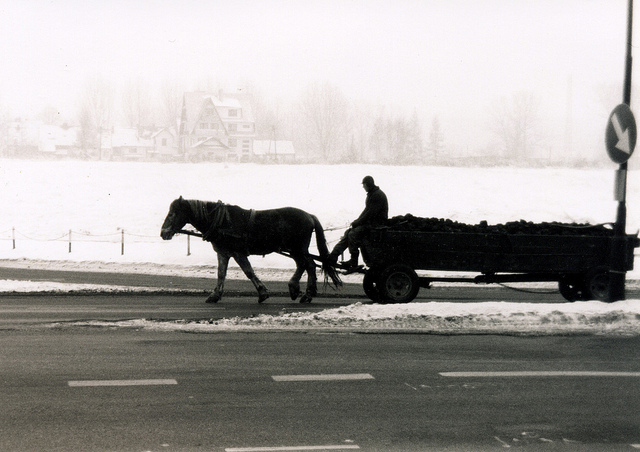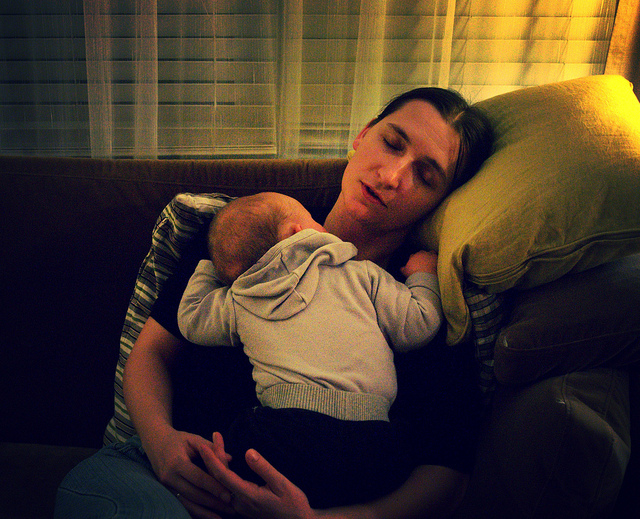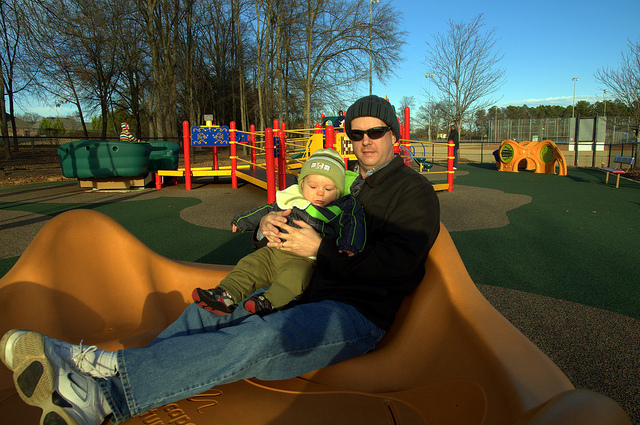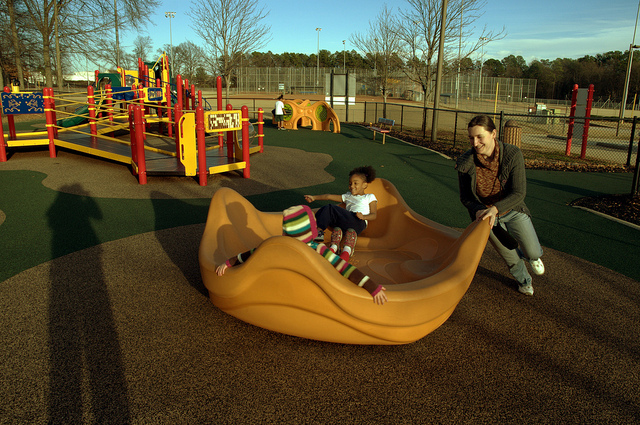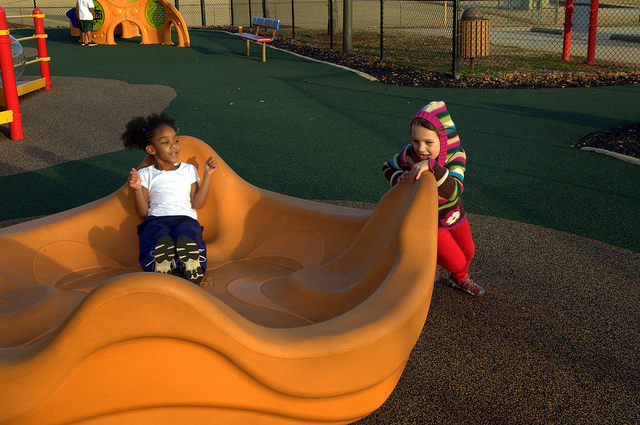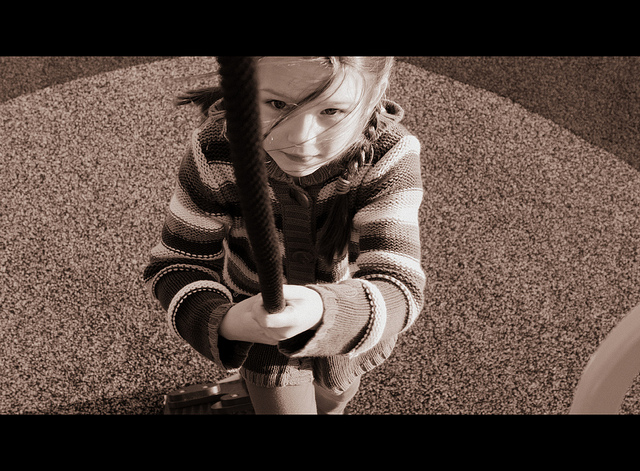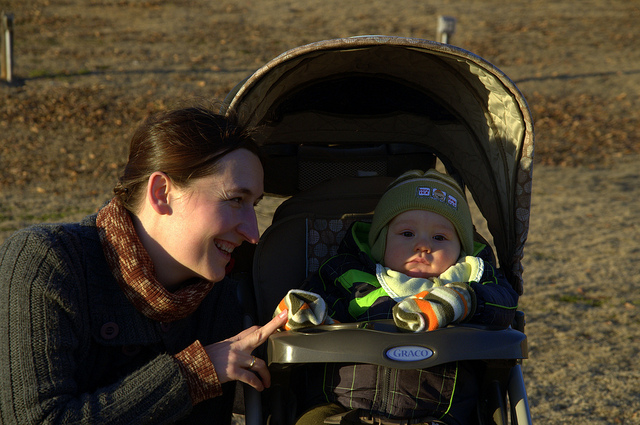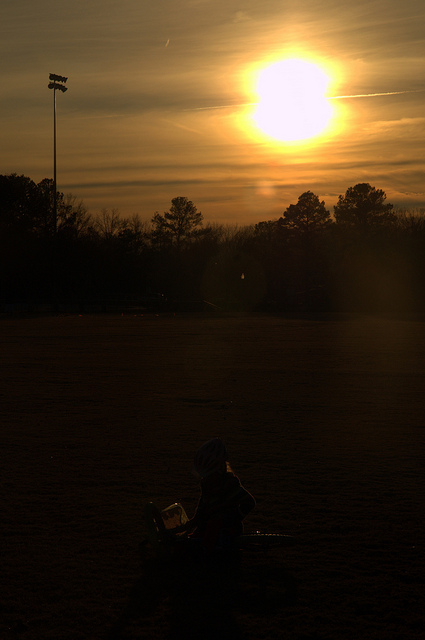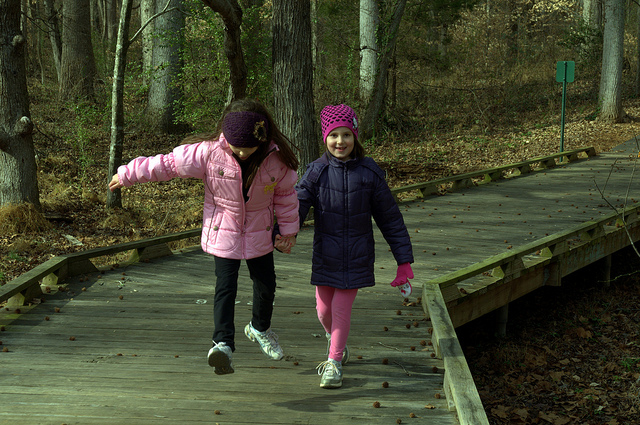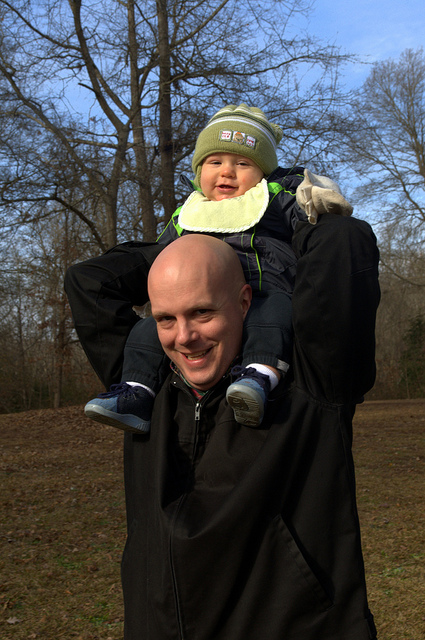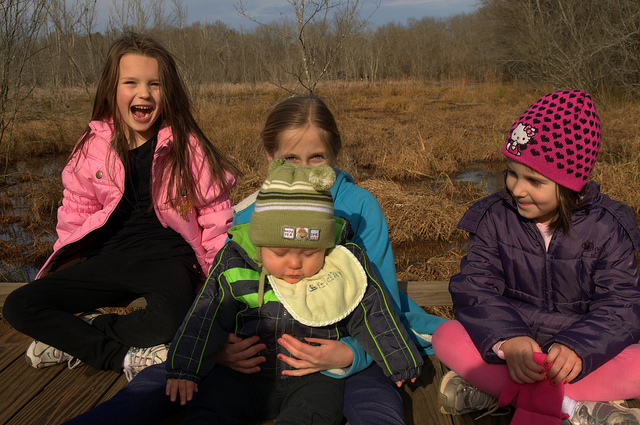A common enough sight in rural Poland: multiple priests of all ages, looking almost like altar boys. Common enough because of the percentages: 95+% Catholic, 5% other, including a few Muslims. These particular priests had gathered for a procession of the Black Madonna through Lipnica Wielka. At the time, I was skeptical, even cynical. Today, I’d view things a little differently.
Coal Delivery
I occasionally look through old pictures from the years I lived in Poland and find a picture that I’d forgotten about but which moves me to mutter to myself, “Wow.” Not that I’m so terribly impressed with my own photography, but more that I’m surprised to see by the reminder of how utterly different my life in Poland in the mid- to late-nineties was.
Two to Five
“I’ve had him for an hour; it’s your turn.” K woke me with those words last night, or rather, this morning, at around three. It’s not an entirely uncommon occurrence, but neither is it really all that frequent. Like most things with infants, the trouble is, you never really know when it’s going to strike. A Tuesday night/Wednesday morning is a particularly bad choice, in my estimation, but there was little I or anyone else could do about it.
I took him in my arms and knew immediately it was not going to be a short exercise. The Boy’s head popped right up, and he glanced around the room, taking in as much as the blue-tinted nightlight could illuminate.
“Nah nah nah!” he cooed, then patted me on the shoulder — his way of saying, “All is well, Dad. Let’s go!”
And go we did. We watched a little bit of a documentary; we played a bit; I graded some papers. (My sarcasm was unmistakable in those particular marginal notes.) At four, the fussing began, and I thought, “Not that bad. An hour? I can survive that.” I walked the circuit through our kitchen and living room. The head plopped down on my shoulder. And stayed down. A few more circles, then up to bed. I lay him in his crib, took two steps away, and the howling began again.
Repeat previous paragraph.
At five, when he finally went down, I figured it made little to no sense to sleep for thirty to forty minutes, so I made the morning coffee and began wondering just what kind of a day was in store for us all.
Shortly after dinner, the inevitable.
Bounce, Swing, Jump, Run
The Boy wants to stand. Just like the Girl at this age, he pushes up into a wobbly standing position any and every time he has enough support.
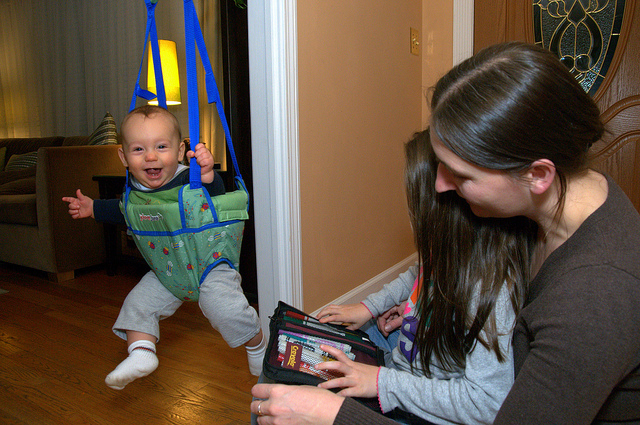
We discovered tonight, though, that unlike L, the Boy loves the strange, hang-in-the-doorway bouncer that we got from who knows where or whom.
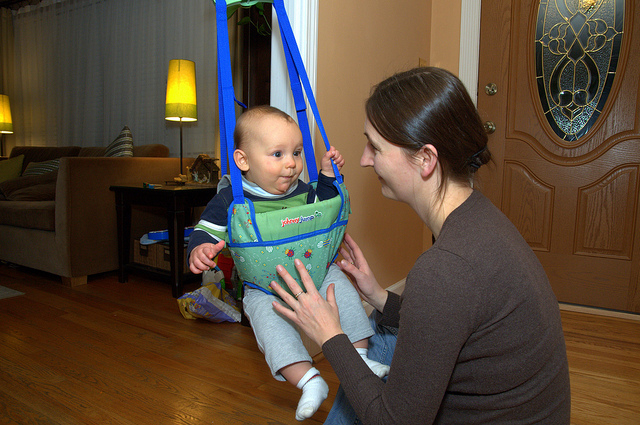
He liked the effect of jumping, bouncing here and there. He liked the effect of swinging, the gentle motion causing him to squeal his “I’m thrilled silly” squeal.
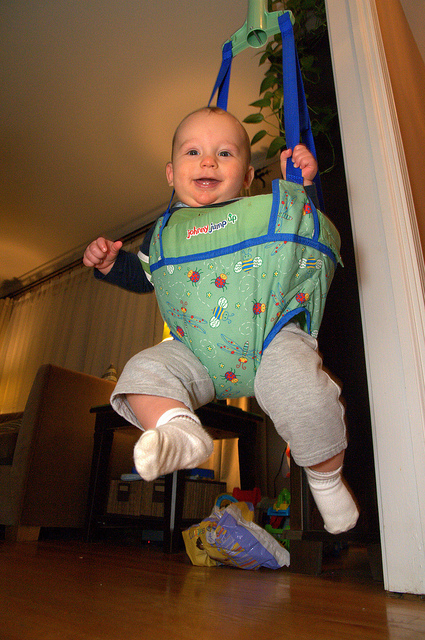
But mostly, he liked to swing his legs wildly. That boy’s going to be a runner, I tell you.
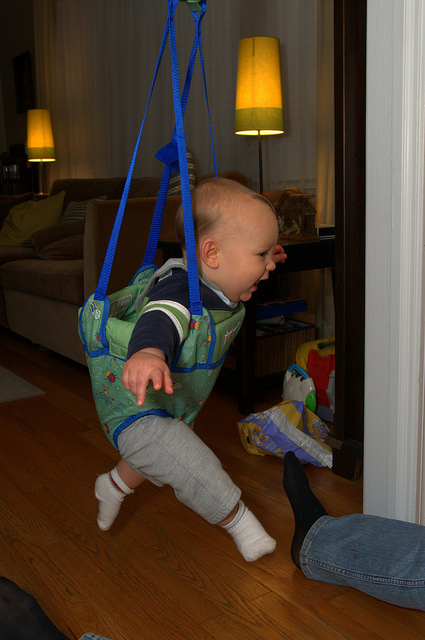
Defining Courage
I’ve been using ideas from George Hillocks, Jr.’s Teaching Argument Writing (Heinemann) in my classroom for some months now. South Carolina’s shift to the Common Core standards necessitates a shift in writing focus to argumentative writing, which is not the same as persuasive writing. The latter relies on rhetorical tricks — arguments from emotion, arguments from authority, etc. — while the former involves claims, counterclaims, evidence, warrants, backing, and a host of other rhetorical goodies.
We’ve been working on “how to develop and support criteria for arguments” (to quote Jim Burke’s blurb about the book), and one of the things Hillocks suggests is to use inductive reasoning to determine some general criteria from specific examples. The extended example he uses in his book is about courage, and since that fits perfectly with my current district-mandated heros-theme unit (the theme is mandated, not the unit itself — well, not entirely), I thought I would use it as is, out of the box, so to speak. Hillocks provides specific scenarios for students to discuss and generalize about. I gave students all the scenarios and told the groups to choose five.

We began working as a class so we could get the feel for the work, and I gave them as an example the easiest.
In the small town of Clinton, teenage boys liked to play “chicken” with their cars. Two boys raced their cars directly at each other. The first boy to swerve to avoid the crash lost. Were the boys courageous when they played “chicken”?
Obviously, the boys of Clinton might be foolhardy or immature, but a courageous act this is not. Indeed, it somehow seems to be the opposite of courageous. Yet a handful of students doggedly insisted, against the judgment of the rest of the class that this acts lack of overriding noble cause (not their exact words) made this foolish at best, that this was a very courageous act.
“They’re risking their lives! They could die!” they persisted.

I thought it might be a fluke, perhaps some kids insisting on playing devil’s advocate. But these same kinds held the same line in all similar scenarios.
Harry learned that millions of dollars in gold would be moved by train from Washington, D.C. to Chicago. He knew it would be heavily guarded and protected by the very best alarm systems. The security guards were top-notch and heavily armed. Harry and his two companions were also heavily armed when they dropped from a bridge to the top of one of the train’s boxcars. They immediately took fire from a guard stationed on the top of another car. They returned fire, killing the guard. Was their attempt to steal the gold courageous?

Who cares about these guys’ motivation? Who cares that they were violating countless moral dictates and laws for material personal gain: these guys were risking their lives and that made their acts courageous.
On the oceanfront, Mr. Jones heard a swimmer shouting for help. He saw sights indicating that this part of the beach was extremely dangerous because of undertows. A lifeguard asked Jones to help him move a boat into the water to be used to help rescue the drowning man. Instead, Jones said, “Don’t be silly!” He ran into the water to swim out to the drowning person. Was Jones’s effort to save the swimmer courageous?
Who cares that the lifeguard clearly knows something Mr. Jones doesn’t, hence his insistence on using the boat? Who cares that in acting impetuously, Mr. Jones was likely giving the lifeguard another potential victim. He was risking his life, and that’s all that matters.
I know of course that much of this is a function of age: thirteen-year-olds are quite fond of justice and courage, and they see the lack of the former in as many places as they see examples of the latter.
Reflection
“Our Father, who art in heaven,” we all intoned together during Mass this morning, and as I recited the prayer, I caught a glimpse of my reflection in the glass separating us in the sadly named “Crying Room” from the rest of the parishioners. For a second, I stared. It’s not that I didn’t recognize myself — that would be silly. But it struck me that the reflection had aged some, that the reflection was somehow not a true image of the real me, the young me, the just getting started me, the “me” we all invest so much energy into. Then, seeing a reflection of L, standing beside me, I realized I was paying less attention to myself of late and more attention to more important things. At least that was the reflection I wanted to see. Ask others and they’re likely to say I haven’t changed that much at all. Or maybe they won’t.
The funny thing about reflections is that they often “distort” because we’ve already distorted our own self-image. Perhaps that’s why so many don’t like having their picture taken: the photo shows them an individual they hardly recognize because it is so misaligned with how they see themselves, or want to see themselves. It’s a reflection they can’t manipulate by turning their good side or altering the light. It’s time and reflection frozen, and those little slices of existence can be very unflattering when taken completely out of the contextual stream of our lives.

In some ways, then, the ultimate mirror is our children. By the time a child is L’s age, she’s reflecting much more than what we show her, and that’s always of concern. Yet children always act as a mirror for parents, and if we parents pay attention, the reflection our children provide can be a self-correction device.
It’s easy to get caught up with this reflected light, though, and think it’s the real thing. Plato and St. Paul both talk about this from different directions but with the same effect: we see ourselves reflected in the crying room glass (what a metaphor for the world — a crying room) and think that reflection is all there is to it. We forget to look through the glass to see what’s on the other side.
The same could happen with our children. When we live too vicariously through our children, when we try to force them to reflect the light we want in all situations, we’re doing the same thing. We’re not looking through the pane of our children’s achievements but merely at our reflection within it.
Looking at my reflection this morning, I thought back to an earlier point in the Mass when the Fr. Joe was swinging the thurible over the altar, with great wafts of smoke rising and curling, slowly creating a haze around the altar that we could have not only seen but smelled had our family not been in self-exile in the crying room. Fr. Joe’s words, too, were altered, coming through speakers that made him sound remote and artificial.
That somehow seems to be a metaphor for all the things we miss out on when we get too caught up in all those reflections. And one of the dangers of always carrying around a camera is the tendency to increase that separation, to view what’s going on around as cliche director in one of those films about films, always going around with his thumbs and forefingers making a rough frame for imagining life to be a film, a two-dimensional projection of one’s own overly-hyped interpretations.
At the very least, we can wait to impose a storyline on life until we are home, the kids are in bed, and we’re sitting a keyboard.
There and Back
When the Girl was much younger, much smaller, and much lighter, we spent a lot of time down at the swing. L could pass whole afternoons in the swing if she would have had someone there patient enough to push her that long. If took the time, I could find pictures of me pushing her, Papa pushing her, Dziadek pushing her, friends pushing her — anyone who came for a visit, down there by the small creek that forms the boundary between our property and the neighbor’s, pushing, pushing, pushing. Higher, higher, higher. That was the formula.

Today, we took the Boy down for the first time.
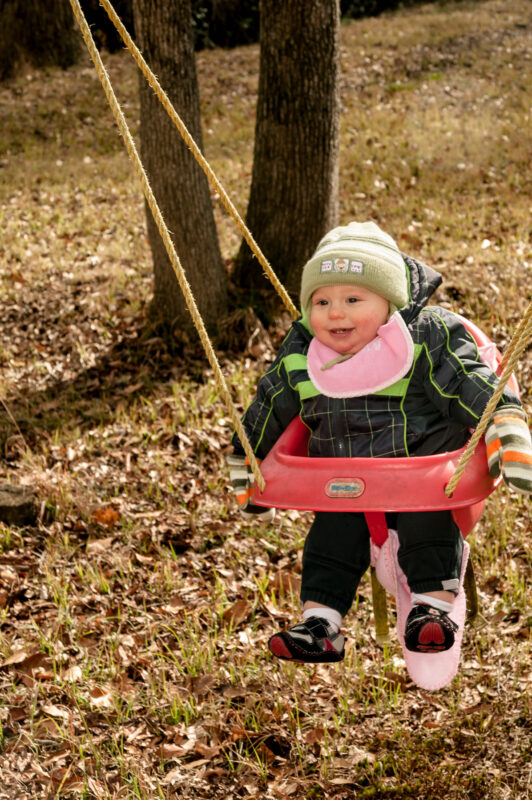
It must be genetic — his love and fascination were instantaneous.
Ecstacy
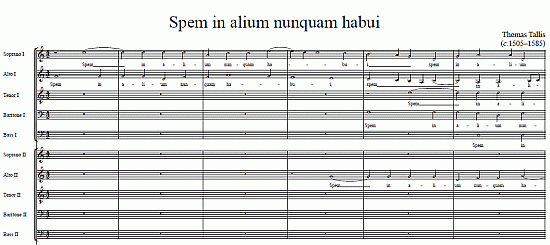
Reading Tony Hendra’s Father Joe: The Man Who Saved My Soul (Amazon) today, I found his first experience with Gregorian chant to resonate with mine, and my experience much sacred music in general. He writes of the sense that this was a timeless music, a music that arose from the passion of the spirit, the soul, instead of the passion of the heart, like most music. I’m not convinced much of what passes for music today could be said to have arisen from the passion of the heart. I rather think its origins are more hedonistic. That being said, much of the music I listened to growing up impressed me with its passion. “Here are people creating from the heart,” I thought.
Then I heard medieval polyphany for the first time. In college, a professor introduced us to Thomas Tallis, and I was immediately in love. Here was the intricacy of the soul itself laid bare. (It’s a bit tragic now that this particular piece will be associated in the popular mind with Fifty Shades of Grey, but the upside, if there is one, is that more people have been exposed to this glorious music and perhaps will investigate Tallis and his contemporaries — Byrd, Desprez, and others.)
Listening to this music, I had, and still have, the experience of ecstasy in the classical Greek sense of ecstasy — ek meaning “outside” and stasis meaning “a stand” — to stand outside oneself.
It was the first real hint I had of the spiritual, the first existential evidence I had of something more.
Leading the Witness
Plinky today asks, “What is your worst quality as a human? Describe it in detail, and why you think it’s bad.” Nothing like a little self-examination to smooth out a Friday evening.
Repetition
Dear JT,
 I’m afraid we in the middle school business have — how I hate that I’m going to use this cliche — set you up for failure. We’re programming you to be a drop-out, and I wish there was something I could do about it, but this is about it: I can explain a simple reality to you.
I’m afraid we in the middle school business have — how I hate that I’m going to use this cliche — set you up for failure. We’re programming you to be a drop-out, and I wish there was something I could do about it, but this is about it: I can explain a simple reality to you.
You’ve figured out the system, how things have worked to this point. You understand that chances are slim you’ll ever be failed another grade. After you’ve failed fourth grade, you figured out that, even if you end the year with all F’s, the school pass you on. That’s a bad choice of words, because you aren’t passed. The technical term is “placed.” As if you’re some object to be arranged in a still life.
However, things are about to change. Though you’re failing every single core class, you’ll move on to ninth grade next year. I know it; you know it; the principal knows it; all the teachers know it; your mother knows it. We all understand that. What you might not understand is the reality waiting for you in high school: teachers will not simply place you in the next grade as can happen in middle school. If you fail English I, you’ll have to take it again. If you fail it again, no one will say, “Well, he failed once; we can’t fail him twice,” and then place you in English II. If you were to fail it yet again, about the only thing the high school teacher and guidance counselor could say is, “Well, better luck the third time.” But by then, and quite probably before the third time, you’ll have dropped out. You’ll judge things to be a no-win situation and you’ll cut your losses and drop out.
At least that’s what I fear.
I don’t know if you actually believe me when I say these things. You’ve probably gotten so many empty threats from teachers in the past that you’re skeptical of everything an authority figure says. But please understand, this is not a threat, and it’s certainly not empty. It’s a word of friendly advice. And, quite frankly, a warning.
Frustrated,
Your Teacher in Room 302
Reading Red
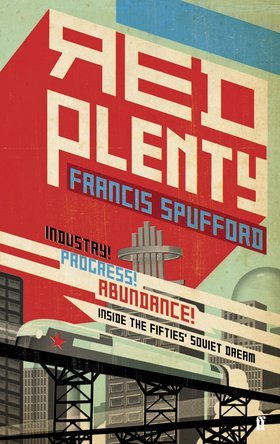
I’m trying to read more of late. I completed — surpassed, even — my goal in the GoodReads.com 2012 reading challenge. I’d set a goal of 30 books in 2012 and I finished 35.
And now it’s time for the 2013 challenge. And I’m reading a really good book. And I’ve promised myself to post daily for as long as possible. And now those two come into conflict, for I want to continue reading, but I must post something here.
“No you don’t,” says K. I hear her now even though she’s asleep in bed.
I don’t. I want to, though, and I want my book, too.
But I guess I’ve solved the problem now…
Contrasts
One day, a day of brilliant sun and warmth. A day of walking and running on boardwalks and paved paths throughout Conestee Park.
A day of friends giggling laughing freely.
A day of a little boy standing a little taller.
A day of friends.
Another day, a day of rainy departures.
I think we all agree: the first day was better.

